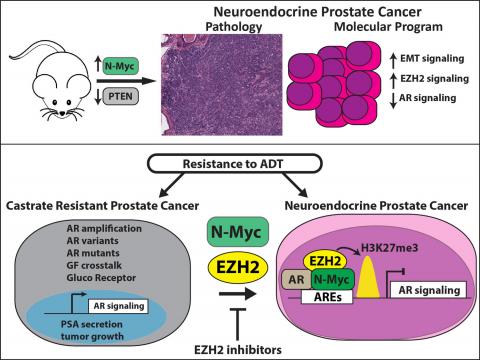Weill Cornell Medicine Rickman Lab
413 E. 69th Street
Belfer Research Bldg
BB-1551
New York, NY 10021
Phone: (646) 962-3599
The focus of the Rickman Lab is to elucidate the role of key oncogenic transcription factors in the biology of prostate cancer and mechanisms of treatment resistance. Our main goal is to define the role and therapeutic potential of N-Myc in driving the neuroendocrine prostate cancer (NEPC) phenotype. NEPC does not respond to hormonal intervention, they frequently metastasize to visceral organs and carry a poor prognosis with an average survival of less than one year. We observed a significant over-expression and gene amplification of MYCN and AURKA (encoding Aurora-A, N-Myc stabilizer) in NEPC. More recently, we have generated novel pre-clinical models of N-Myc driven prostate cancer including genetically engineered mice that molecularly and histologically mimic clinical NEPC. These models helped us elucidate the role of N-Myc in AR-signaling downregulation through EZH2 (Enhancer of Zeste Homolog 2) recruitment. We are now expanding the characterization of the N-Myc-regulated epigenetic mechanisms driving the NEPC phenotype.
The Lab Team

The Rickman Lab features a diverse set of postdoctoral researchers, graduate students, and research technicians performing basic and translational research in neuroendocrine prostate cancer.
Our Research

The focus of the Rickman Lab is to elucidate the role of key oncogenic transcription factors in the biology of prostate cancer and mechanisms of treatment resistance.


